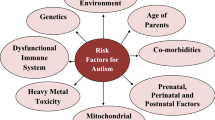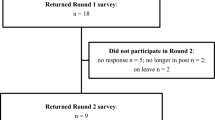Abstract
Objective
To investigate the relationship between intellectual functioning, symptom severity, and adaptive behavior functioning of children with autism spectrum disorders (ASD).
Methods
Retrospective case records (1999 to 2013) of 523 children [Mean age 4.79y (SD 2.37)] maintained by the Pediatric Psychology Unit at the Department of Pediatrics of a tertiary care teaching hospital in North India were examined. The adaptive behavior functioning was measured by the Indian adaptation of the Vineland Social Maturity Scale. Symptom severity was assessed using the Childhood Autism Rating Scale (CARS).
Results
The mean Social Quotient (SQ) of the sample was 62.40 (SD = 20.41). Nearly two-third (63.3%) of the ASD had SQs less than 70 and only 15% of the ASD children had SQs above 85. Adaptive behavior scores in the lower functioning ASD children were significantly higher than their Intelligence Quotient (IQ) scores while for the high functioning ASD group, the SQs were significantly lower than their IQs. Multiple regression analysis revealed that IQ, age of the child, CARS score, and education of the mother accounted for 62.5% of the variance in the SQ of children with ASD (F = 198.01, P 0.000).
Conclusions
Adaptive behavior measures must constitute a crucial component of not only diagnostic assessment of ASD children but also as an important goal of treatment.

Similar content being viewed by others
References
American Psychiatric Association. Diagnostic and statistical manual of mental disorders. 4th ed. Washington DC: American Psychiatric Association; 1994.
Giangreco MF, Broer SM. Questionable utilization of paraprofessionals in inclusive schools: are we addressing symptoms or causes? Focus Autism Other Dev Disabil. 2005;20:10–26.
Engstrom I, Ekstrom L, Emilsson B. Psychosocial functioning in a group of Swedish adults with Asperger syndrome or high functioning autism. Autism. 2003;7:99–110.
Eaves LC, Ho H. Young adult outcome of autism spectrum disorders. J Autism Dev Disord. 2008;38:739–47.
Howlin P, Savage S, Moss P, Tempier A, Rutter M. Cognitive and language skills in adults with autism: a 40-year follow-up. J Child Psychol Psychiatry. 2014;55:49–58.
Farley MA, McMahon WM, Fombonne E, Jenson WR, Miller J, Gardner M. Outcome for adults diagnosed in childhood with autism and average or near-average cognitive abilities. Autism Res. 2009;2:109–18.
Carpentieri S, Morgan SB. Adaptive and intellectual functioning in autistic and nonautistic retarded children. J Autism Dev Disord. 1996;26:611–20.
Bolte S, Poustka F. The relation between general cognitive level and adaptive behavior domains in individuals with autism with and without co-morbid mental retardation. Child Psychiatry Hum Dev. 2002;33:165–72.
Fenton G, D’Ardia C, Valente D, Vecchio DI, Farbrizi A, Bernabei P. Vineland adaptive behavior profiles in children with autism and moderate to severe developmental delay. Autism. 2003;7:269–87.
Kenworthy L, Case MB, Harms AM, Martin A, Wallace GL. Adaptive behavior ratings correlate with symptomatology and IQ among adolescents with high-functioning autism spectrum disorders. J Autism Dev Disord. 2010;40:416–23.
Kanne SM, Gerber AJ, Quirmbach LM, Sparrow SS, Cicchetti DV, Saulnier CA. The role of adaptive behavior in autism spectrum disorders: implications for functional outcome. J Autism Dev Disord. 2011;41:1007–18.
Bishop LS, Luyster R, Richler J, Lord C. Diagnostic assessment. In: Chawarska K, Klin A, Volkmar FR, editors. Autism spectrum disorders in infants and toddlers. New York: Guilford Press; 2008. p. 50–75.
Tomanik SS, Pearson DA, Loveland KA, Lane DM, Shaw JB. Improving the reliability of autism diagnoses: examining the utility of adaptive behavior. J Autism Dev Disord. 2007;37:921–8.
Malin AJ. The Indian adaptation of the Vineland Social Maturity Scale. Lucknow: Indian Psychological Corporation; 1971.
Sparrow S, Balla D, Cicchetti D. Vineland Adaptive Behavior Scales Interview ed.—survey form. Circle Pines: American Guidance Service; 1984.
Raggio DJ, Massingale TW. Comparison of the Vineland Social Maturity Scale, the Vineland Adaptive Behavior Scales—survey form, and the Bayley Scales of Infant Development with infants evaluated for developmental delay. Percept Mot Skills. 1993;77:931–7.
Britton WH, Eaves RC. Relationship between the Vineland Adaptive Behavior Scales-Classroom Edition and the Vineland Social Maturity Scales. Am J Ment Defic. 1986;91:105–7.
Alpern B, Boll T, Shearer M. Developmental Profile II. Los Angeles: Western Psychological Services; 1986.
Alpern GD. Developmental Profile 3—Manual. Los Angeles: Western Psychological Services; 2007.
Malin AJ. Intelligence scale for Indian children (MISIC): Indian adaptation of Wechsler’s Intelligence Scale for Children. Lucknow: Indian Psychological Corporation; 1969.
Perry A, Flanagan HE, Dunn Geier J, Freeman NL. Brief report: the Vineland Adaptive Behavior Scales in young children with autism spectrum disorders at different cognitive levels. J Autism Dev Disord. 2009;39:1066–78.
Klin A, Saulnier CA, Sparrow S, Cicchetti DV, Volkmar FR, Lord C. Social and communication abilities and disabilities in higher functioning individuals with autism spectrum disorders: The Vineland and the ADOS. J Autism Dev Disord. 2007;37:748–59.
Schopler E, Reichler R, Rochen Renner B. The Childhood Autism Rating Scale. Los Angeles: Western Psychological Services; 1988.
Saulnier CA, Klin A. Brief report: social and communication abilities and disabilities in higher functioning individuals with autism and Asperger syndrome. J Autism Dev Disord. 2007;37:788–93.
Sparrow SS, Cicchetti D, Balla DA. Vineland Adaptive Behavior Scales—2nd ed. Minneapolis: NCS Pearson Inc; 2005.
Schatz J, Hamdan-Allen G. Effects of age and IQ on adaptive behavior domains for children with autism. J Autism Dev Disord. 1995;25:51–60.
Liss M, Harel B, Fein D, Allen D, Dunn M, Feinstein C, et al. Predictors and correlates of adaptive functioning in children with developmental disorders. J Autism Dev Disord. 2001;31:219–30.
De Bildt A, Kraijer D, Sytema S, Minderaa R. The psychometric properties of the Vineland Adaptive Behavior Scales in children and adolescents with mental retardation. J Autism Dev Disord. 2005;35:53–62.
Ray-Subramanian CE, Huai N, Weismer SE. Brief report: adaptive behavior and cognitive skills for toddlers on the autism spectrum. J Autism Dev Disord. 2011;41:679–84.
Walker SP, Wachs TD, Grantham-McGregor S, Black MM, Nelson CA, Huffman SL, et al. Inequality in early childhood: risk and protective factors for early child development. Lancet. 2011;378:1325–38.
Contributions
PM: Collected the data, collated and analyzed it, and wrote the manuscript. PS: Helped in writing the manuscript. Both the authors jointly made the diagnosis. PM will act as guarantor for this paper.
Conflict of Interest
None.
Source of Funding
None.
Author information
Authors and Affiliations
Corresponding author
Rights and permissions
About this article
Cite this article
Malhi, P., Singhi, P. Adaptive Behavior Functioning in Children with Autism. Indian J Pediatr 82, 677–681 (2015). https://doi.org/10.1007/s12098-015-1692-8
Received:
Accepted:
Published:
Issue Date:
DOI: https://doi.org/10.1007/s12098-015-1692-8




